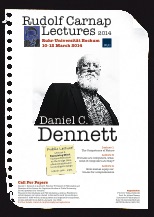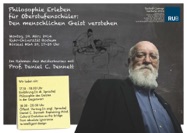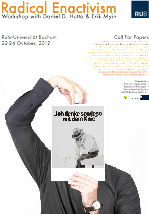Archive

Workshop at Ruhr-Universität Bochum, Sept 29th - Oct 1st, 2014,
Speakers
Tim Bayne, Anne-Sophie Brüggen, Sara Rachel Chant,
Tim Crane, Katalin Farkas, Thomas Metzinger, Albert Newen,
Robert Rupert, Tobias Schlicht, Charles Siewert, Corrado Sinigaglia,
Shannon Spaulding, Deborah Tollefsen, Robert Van Gulick, Gottfried Vosgerau, and others.
Watch out for more information at www.rub.de/philosophy/dimensionsofintentionality.
__________________________________________________________________________________________
Prof. Dennett gave four lectures:
1. Explaining Mind. Cultural Evolution as the Bridge from Absolute Ignorance to Intelligent Design
2. The Competence of nature
3. If Brains are computers, what kind of computers are they?
4. How memes equip our brains for comprehension
On Monday 10th March, Daniel Dennett will present a special lecture open to the
public, with an introduction by Albert Newen and Tobias Schlicht (in German)
directed at students and interested pupils from schools from the Ruhr area.
5pm - 6pm
Radical Enactivism
Workshop with Daniel D. Hutto (Hertfordshire) and Erik Myin (Antwerp)
Ruhr-Universität Bochum
22-24 October, 2012
Hutto and Myin are going to present and discuss their forthcoming book
Radicalizing Enactivism (MIT Press). Graduate students and Post-docs
are encouraged to submit papers on this topic and surrounding themes.
For further information contact tobias.schlicht (at) rub.de
__________________________________________________________________________________________

Philosophical Workshop
Ruhr-Universität Bochum
19-21 July 2012
It has been suggested that body and environment, technical tools and even society play
not only a causal role in shaping mental states but a constitutive one. This idea forces
us to reconsider the traditional concept of intentionality and the intersections of the mind
with these presumably external factors. This workshop is dedicated to a philosophical
investigation of the mind’s interfaces. How do shared emotions affect cognitive actions
in an intersubjective context? How does the body interfere with the mind? How exactly
does the environment shape the mind in situated action? What is the relation of phenomenal
intentionality to other forms of intentionality?
Speakers
Kenneth Aizawa, Ron Chrisley, Helena de Preester, Shaun Gallagher, Holger Lyre,
Richard Menary, Angela Mendelovici, Kristof Nyíri, David Pitt, Andreas Roepstorff,
Robert Rosenberger, Robert Rupert, Hans Bernhard Schmid, Corrado Sinigaglia, Jan Slaby
Organization
Prof. Dr. Tobias Schlicht (Bochum), Prof. Dr. Gottfried Vosgerau (Düsseldorf)
__________________________________________________________________________________________
Social Cognition, Engagement, and the Second-Person-Perspective
Interdisciplinary Conference, Universität zu Köln, 25-27 May 2012

of human nature. But how we understand other minds remains controversial. This workshop gathered philosophers, psychologists, psychiatrists and neuroscientists to promote interdisciplinary investigations on the prospects of a second-person approach to
social cognition: How might social cognitive processes differ in
these different situations? How do these processes relate to one another? Do engagement and interaction with the other modulate
the processes underlying social understanding? What is the impact
of these distinctions for research methodologies in social psychology and social neuroscience as well as for our understanding of conditions like autism?
Speakers and discussants
Cristina Becchio (Torino), Alan Costall (Portsmouth), Chris & Uta Frith (London), Thomas Fuchs (Heidelberg), Tobias Grossmann (Leipzig), Riita Hari (Helsinki), Günther Knoblich (Nijmegen), Agnes Kovács (Budapest), Joel Krueger (Kopenhagen), Victoria McGeer (Princeton), Albert Newen (Bochum), Vasudevi Reddy (Portsmouth), Eric Rietveld (Amsterdam), Norihiro Sadato (Tokyo), Natalie Sebanz (Nijmegen), Corrado Sinigaglia (Milan), and Kai Vogeley (Cologne).
Scientific Organization
Prof. Dr. Tobias Schlicht (Philosophy, Bochum), Dr. Leonhard Schilbach (Psychiatry, Cologne), Dr. Nikolaus Steinbeis (Psychology, Leipzig), Bert Timmermans (Psychology, Cologne/Brussels)
_________________________________________________________________________________________
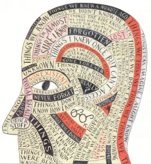
Epistemic Feelings and Metacognition
Interdisciplinary workshop
Bochum, 28-29 October 2011
Researchers working on metacognition, problem solving, decision-making,
metamemory and rationality have coined the term “epistemic feeling” to refer
to a particular kind of experience that one undergoes when confronted with
cognitive tasks. Examples include the feeling of knowing and of forgetting,
the feeling of confidence or of uncertainty, the tip-of-the-tongue phenomenon,
and others. This workshop brings together researchers from philosophy,
psychology and cognitive neuroscience trying to further understand these phenomena.
Invited Speakers
Santiago Arango-Muñoz (Bochum), Sabine Döring (Tübingen), Jérôme Dokic (Jean Nicod, Paris), Anastasia Efklides (Thessaloniki), Peter Goldie (Manchester), Anita Konzelmann Ziv (Genève), Chris Moulin (Leeds), Jennifer Nagel (Toronto), Bennett Schwartz (Miami), Celine Souchay (Leeds)
Organization
Santiago Arango Muñoz, Prof. Dr. Tobias Schlicht (RUB)
_________________________________________________________________________________________
Workshop on the Imagination and Imaginings
November 5-6, 2010, Universität Tübingen

imagination as a mental capacity and the nature of imaginings. We
focused on the following key issues: Can we formulate a unified theory
of imaginings and what would such a theory look like? What is the
nature and common feature of all and only imaginings? What is the
impact of such a theory on the architecture of the mind, on the relation
of imaginability, conceivability and possibility, and on the debate about
mental imagery?
Speakers
Margherita Arcangeli (Institut Jean Nicod Paris), Alma Barner (Köln), Anne-Sophie Brueggen (Universitaet Bochum), Jérôme Dokic (Institut Jean Nicod Paris), Fabian Dorsch (University of Fribourg), Frank Hofmann (Universitaet Tuebingen), Jonathan Ichikawa (Arché, St Andrews), Amy Kind (Claremont McKenna College),
Kathleen Stock (University of Sussex)
Organisation
Anne-Sophie Brueggen, MA, Prof. Dr. Tobias Schlicht,
Prof. Dr. Frank Hofmann (Tübingen),
________________________________________________________________________________________
Universität Tübingen and Centre for Integrative Neuroscience,
July 17-18, 2010
Materialists hold that consciousness is physical and can be explained in physical terms. In order to defend their position against dualist arguments, e.g. the charge that there remains an explanatory gap between physical events and subjective conscious experience, many materialists employ the so-called phenomenal concept strategy.
According to this position, the explanatory gap results naturally from peculiar features of the special concepts we use to refer to our conscious experiences—phenomenal concepts like “pain”, “itch”, “red sensation” etc.
This workshop, organized by Frank Hofmann and myself, brings together proponents and critics of this strategy. Central topics of this workshop are the credibility of this strategy, the question whether there are such concepts in contrast to physical concepts, the fate of materialism and its prospects for explaining consciousness.
Speakers include Derek Ball (St Andrews), Janet Levin (USC), Albert Newen (Bochum), David Papineau (King’s), and Michael Tye (Texas).
_________________________________________________________________________________________
ESPP Symposium on Being Addressed as You:
Towards a Second-Person Approach to Social Cognition
Bochum and Essen, August 25-28, 2010
Although there has been a paradigm shift in the cognitive sciences towards enactive/embodied/embedded accounts of cognition, the resources of this paradigm have not yet been exploited for the social domain. The talks in this symposium investigate the motivations, constituents and possible limitations of such an approach. In particular, they argue that central ideas from the enactive approach support a Second-Person account of understanding other minds, in contrast to traditional third-person (theory-theory) and first-person approaches (simulation-theory). Moreover, they integrate evidence from social neuroscience and developmental psychology in order to support such a philosophical position.
The central claim of the Second-Person Approach is that there is a fundamental difference between social cognition when we are directly engaged with someone and social cognition when we are merely observing others. The most fundamental kind of social understanding in direct interaction is constituted by a skillful ‘know-how’ to deal with other people.
Speakers
Vasidevi Reddy & Alan Costall (Portsmouth), Leonhard Schilbach, Tobias Schlicht
__________________________________________________________________________________________

Berlin, June 6th, 2009
I organized a symposium on Attention and Consciousness at the
13th meeting of the ASSC in Berlin, June 4th-8th 2009 - featuring
speakers Alva Noë (Berkeley), Ronald Rensink (Vancouver), and
Michael Tye (U Texas at Austin).
Further information: www.assc13.com
__________________________________________________________________________________________
Joint Attention
Bochum, August 15th-16th, 2008
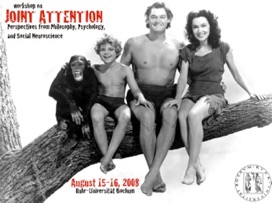
I organized this workshop with Albert Newen, featuring scientists from philosophy, psychology and social neuroscience in order to advance our understanding of the status, structure and neuronal mechanisms of joint attention in its function for social interaction. From a philosophical point of view, joint attention is one significant complex form of intentionality - the cognitive capacity to engage in triadic intentional relations, like two people directing their attention toward an object.
The capacity is not only a crucial qualitative step in the psychological development of human beings. According to some, triangulation in general also plays a central role in epistemological debates. Social cognitive neuroscientists are now gathering data with respect to the specific neuronal mechanisms underlying joint attention.
